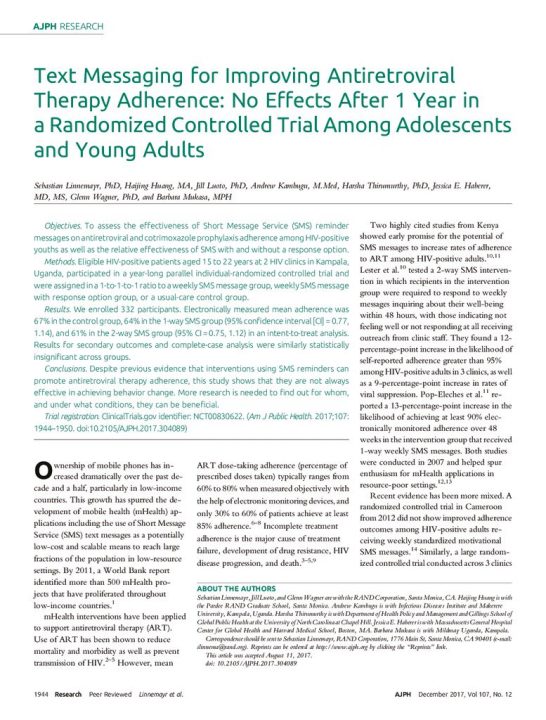
Text Messaging for Improving Antiretroviral Therapy Adherence: No Effects After 1 Year in a Randomized Controlled Trial Among Adolescents and Young Adults
Summary
The recently published study was conducted over the course of one year using text message reminders to improve ART adherence. Although previous studies have shown this to work, this study did not find any impact among adolescents and young adults using text message reminders. Both 1-way and 2-way messages were tested against a control group. Message for the 1-way Short Message Service (SMS) was “We hope you are feeling well today” For the 2-way messaging it was “We hope you are feeling well today. Reply 1 if well, 2 if unwell.” There was a follow-up message after 48 hours if no response was given. If they responded they were unwell, there was a follow-up call within 24 hours. Details below:
Abstract
OBJECTIVES:
To assess the effectiveness of Short Message Service (SMS) reminder messages on antiretroviral and cotrimoxazole prophylaxis adherence among HIV-positive youths as well as the relative effectiveness of SMS with and without a response option.
METHODS:
Eligible HIV-positive patients aged 15 to 22 years at 2 HIV clinics in Kampala, Uganda, participated in a year-long parallel individual-randomized controlled trial and were assigned in a 1-to-1-to-1 ratio to a weekly SMS message group, weekly SMS message with response option group, or a usual-care control group.
RESULTS:
We enrolled 332 participants. Electronically measured mean adherence was 67% in the control group, 64% in the 1-way SMS group (95% confidence interval [CI] = 0.77, 1.14), and 61% in the 2-way SMS group (95% CI = 0.75, 1.12) in an intent-to-treat analysis. Results for secondary outcomes and complete-case analysis were similarly statistically insignificant across groups.
CONCLUSIONS:
Despite previous evidence that interventions using SMS reminders can promote antiretroviral therapy adherence, this study shows that they are not always effective in achieving behaviour change. More research is needed to find out for whom, and under what conditions, they can be beneficial.
